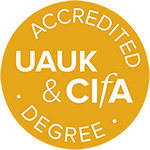Current filters applied:
- (-) Remove Mediterranean filter Mediterranean
- (-) Remove Material Culture filter Material Culture
Displaying 11 projects
The above photo shows: A left lateral aspect of a cranium from Catignano (a Middle Neolithic village in Abruzzo), showing two healing trepanations on the left parietal bone and healed fracture on the left frontal and parietal bones of a 40-50 year old female How did politics and inequality work in...
Archaeological data is often biased and incomplete. This is a well-known issue for most archaeologists. Although studies of specific sites and small regions can have this into account, the effect of this problem increases exponentially as archaeologists expand their chronological and geographic...
‘BODIES MATTER’ focuses on the material culture of bodies (and the self) in colonial borderlands by comparing three frontiers at various periods and geographies: the Spanish Empire’s southern borderland in the Americas in the AD 16th-19th century, the Punic western Mediterranean in the 6th-2nd...
A large-scale multi-disciplinary study of pre-Roman iron technology in the Iberian Peninsula.
The project focuses on the models of circulation of raw materials during the Iberian Late Prehistory, as well as the use and social value given to the different materials, with special attention to metals and amber.
This project aims to gain a better understanding of the relationship of Crete with the world outside the island through the lens of a key body of materials: goldwork.
The PROCON project explores the role of textile production and consumption in the formation of early states, using the example of Mediterranean Europe during 1000-500 BCE.
The aim of this project will be to investigate the nature and impact of Roman imperialism on the frontiers of North Africa (specifically the Maghreb), especially in considering the role of Roman imperialism on the political economy of the region and its impact on both pre-existing communities and...
The Promised project forms a network of excellence in Bioarchaeology and Archaeological Materials Science within the Science and Technology in Archaeology and Culture Research Center (STARC) at the Cyprus Institute linked with the advanced research centres in Archaeological Science at KU Leuven and the University of Cambridge.
Cambridge is home to world-leading researchers across archaeological science, technical art history and heritage science, based at Department of Archaeology, the Fitzwilliam Museum, and the Hamilton Kerr Institute, among others. There are multiple synergies across these institutions in terms of...
The PlaCe network is a high-profile partnership focused on the interdisciplinary study of pre-modern ceramics and plasters. This Innovative Training Network aims at training Early-Stage Researchers to conduct state-of-the-art, science-based research on the technology, use, and provenance of...


